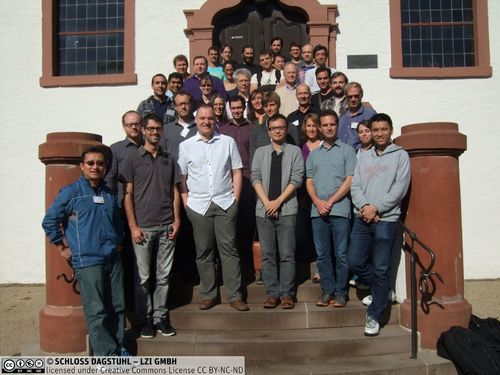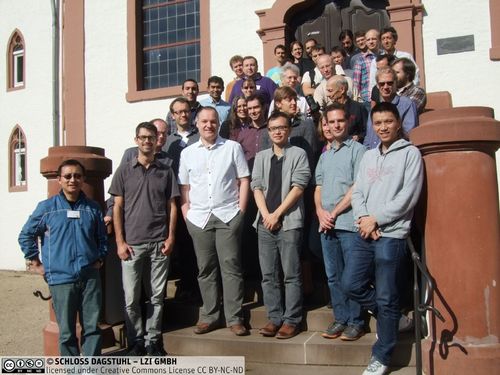Dagstuhl-Seminar 14361
Computational Aspects of Fabrication
( 31. Aug – 05. Sep, 2014 )
Permalink
Organisatoren
- Marc Alexa (TU Berlin, DE)
- Bernd Bickel (Disney Research - Zürich, CH)
- Sara McMains (University of California - Berkeley, US)
- Holly E. Rushmeier (Yale University, US)
Kontakt
- Annette Beyer (für administrative Fragen)
Programm
As manufacturing goes digital, the current understanding of industrial production will change fundamentally and start the "third industrial revolution". The digital age in manufacturing is coupled with new output devices that allow rapid customization and rapid manufacturing, revolutionizing the way we design, develop, distribute, fabricate, and consume products. We need to find computational models that support this new way of productional thinking and lead its technological understanding. This opens challenges for many areas of science research, such as material science, chemistry, engineering, but also and perhaps foremost computer sciences.
The currently available digital content creation pipelines, algorithms, and tools cannot fully explore new manufacturing capabilities. To meet these demands, we need a deep understanding of digital representations of shape, its appearance, and mechanical behavior. When designing an object, all these fundamental aspects interplay.
There have been many research papers scattered through the computer science literature treating different relevant aspects of fabrication. In this seminar we will gather together these various threads and organize the computational accomplishments and outstanding challenges. A major problem that needs to be addressed is identifying techniques that are missing in current design tools for physical manufacturing. Our goal is to make design for manufacture as robust as current tools are for design for computer display. Other disciplines provide basic material and mechanical models, but expertise in numerical analysis, computer graphics and human computer interaction is needed to produce the missing tools.
The outcome of this seminar will be a computation research agenda for rapid manufacturing techniques. Within this research agenda we will address needs in appearance, form, and the analysis of both static and dynamic performance of the output of these manufacturing processes. Furthermore, we will detail the areas of collaboration that need to be extended to develop effective tools. Finally we will present a vision of new areas of application that will be enabled by rapid manufacturing processes that are informed by advanced computational methods.
As manufacturing goes digital, the current understanding of industrial production will change fundamentally. The digital age in manufacturing is coupled with new output devices that allow rapid customization and rapid manufacturing, revolutionizing the way we design, develop, distribute, fabricate, and consume products. We need to find computational models that support this new way of production thinking and lead its technological understanding. This opens challenges for many areas of science research, such as material science, chemistry, and engineering, but also and perhaps foremost computer sciences. The currently available digital content creation pipelines, algorithms, and tools cannot fully explore new manufacturing capabilities. To meet these demands, we need a deep understanding of computer graphics fundamentals: Shape, appearance of shape and materials, and physically-based simulation and animation. When designing an object, there is an inherent interplay among all these fundamental aspects.
The purpose of this seminar is to bring together leading experts from academia and industry in the area of computer graphics, geometry processing, and digital fabrication. The goal is to address fundamental questions and issues related to computational aspects of fabrication and jump-start collaborations that will pioneer new approaches in this area.
 Marc Alexa, Bernd Bickel, Sara McMains, and Holly E. Rushmeier
Marc Alexa, Bernd Bickel, Sara McMains, and Holly E. Rushmeier
- Marc Alexa (TU Berlin, DE) [dblp]
- Moritz Bächer (Disney Research - Zürich, CH) [dblp]
- Bernd Bickel (Disney Research - Zürich, CH) [dblp]
- Nathan Carr (Adobe Inc. - San José, US) [dblp]
- Duygu Ceylan (EPFL - Lausanne, CH) [dblp]
- Yong Chen (University of Southern California, US) [dblp]
- Paolo Cignoni (CNR - Pisa, IT) [dblp]
- Stelian Coros (Carnegie Mellon University - Pittsburgh, US) [dblp]
- Bailin Deng (EPFL - Lausanne, CH) [dblp]
- Piotr Didyk (MIT - Cambridge, US) [dblp]
- Gershon Elber (Technion - Haifa, IL) [dblp]
- Wolfgang Heidrich (KAUST - Thuwal, SA) [dblp]
- Kristian Hildebrand (TU Berlin, DE) [dblp]
- Leif Kobbelt (RWTH Aachen, DE) [dblp]
- Manfred Lau (Lancaster University, GB) [dblp]
- Sylvain Lefebvre (LORIA & INRIA - Nancy, FR) [dblp]
- Steve Marschner (Cornell University, US) [dblp]
- Sara McMains (University of California - Berkeley, US) [dblp]
- Eder Miguel (University Rey Juan Carlos, ES) [dblp]
- Niloy Mitra (University College London, GB) [dblp]
- Stefanie Müller (Hasso-Plattner-Institut - Potsdam, DE) [dblp]
- Mark Pauly (EPFL - Lausanne, CH) [dblp]
- Nico Pietroni (ISTI-CNR - Pisa, IT) [dblp]
- Helmut Pottmann (KAUST - Thuwal, SA) [dblp]
- Holly E. Rushmeier (Yale University, US) [dblp]
- Szymon Rusinkiewicz (Princeton University, US) [dblp]
- Ryan Schmidt (AUTODESK Research - Toronto, CA) [dblp]
- Carlo H. Sequin (University of California - Berkeley, US) [dblp]
- Kristina Shea (ETH Zürich, CH) [dblp]
- Karan Singh (University of Toronto, CA) [dblp]
- Melina Skouras (Disney Research - Zürich, CH) [dblp]
- Bernhard Thomaszewski (Disney Research - Zürich, CH) [dblp]
- Nobuyuki Umetani (Disney Research - Zürich, CH) [dblp]
- Gordon Wetzstein (Stanford University, US) [dblp]
- Tim Weyrich (University College London, GB) [dblp]
- Emily Whiting (Dartmouth College - Hanover, US) [dblp]
- Denis Zorin (New York University, US) [dblp]
Verwandte Seminare
- Dagstuhl-Seminar 18431: Computational Aspects of Fabrication (2018-10-21 - 2018-10-26) (Details)
Klassifikation
- computer graphics / computer vision
Schlagworte
- Fabrication
- Manufacturing Process Characterization (additive
- machining)
- 3d printing
- Layered Manufacturing
- 3d Rasterization
- Geometric Modeling
- Shape Perception
- Material Properties (mechanical/optical)



 Creative Commons BY 3.0 Unported license
Creative Commons BY 3.0 Unported license
